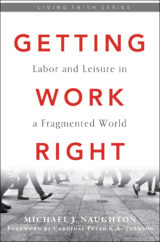By Michael Naughton
Dr. Michael Naughton is the director of the Center for Catholic Studies at the University of St. Thomas (Minnesota). He holds the Koch Chair in Catholic Studies and is a full professor in the department of Catholic Studies. Dr. Naughton also serves as board chair for Reell Precision Manufacturing. He helped coordinate and write the Vocation of the Business Leader issued by the Dicastery for Promoting Integral Human Development, which has been translated in over fifteen languages. He is the author, co-author, and co-editor of ten books and over fifty articles, including Getting Work Right: Labor and Leisure in a Fragmented World.

We cannot simply achieve our vocation. We need to receive it, and this is why we need Christ, the Church, and, perhaps surprisingly, Sunday—the Sabbath. Sunday is a day of worship, rest, of celebration, of receptivity. It has been said that “More than the Jewish People have kept the Sabbath, the Sabbath has kept the Jews.” The same can be said for Christians. More than Christians keeping their Sunday obligation, the Lord’s Day has kept the Church.
“If you want to kill Christianity,” it has been said, “you must abolish Sunday.” Things can be abolished in multiple ways. Romano Guardini speaks about how certain economic and social forces constantly shove Sunday aside. He writes, “Work gnaws at it; amusement elbows its way into it, crowding out holiness; the significance of keeping holy is misunderstood, and rest is imposed with a resultant boredom that is worse than if work had continued.” Through overfull sports schedules, mindless amusements, the ubiquity of screens that never shut off, and the habit of viewing Sunday as a mop-up day from the previous week’s activities, the Sabbath loses power to recreate and renew our relationship with the Lord and with others.
Christians, in particular, can too easily dismiss the Third Commandment, “Keep Holy the Sabbath.” If we violated the commandment about adultery the way we typically violate the command for keeping the Sabbath, we would see more clearly the wreckage it causes. “Honey, I tried not committing adultery this week, but it didn’t quite work; but I will try again next week.” No marriage would last long under such circumstances. The Sabbath—the commandment to both rest and celebrate— is essential to our work and to the order of our lives.
The power of Sunday, the Lord’s Day, the Sabbath, is found in its potential for keeping us free: Sunday is the day when production, consumption, and especially technology do not own us; when we are defined not by our doing or having, but by our being made in God’s image; when we remember that life is a gift given, not a task achieved. Sunday helps us to see and to maintain our true identity. If we do not get Sunday right, we will not get Monday right.
Stephen Covey wrote an excellent book entitled Seven Habits of Highly Effective People. It has sold over twenty-five million copies in forty languages and is considered one of the most influential leadership books ever written. There are many good points in Covey’s treatment; but the seventh habit, which he calls, “sharpen the saw,” helps us to see a particular problem. According to this rendering, we rest from our work in order to become more productive, to increase our capacity to handle challenges, to recharge ourselves so that we can achieve success. All of this is true, but the danger is that this can create a state of mind that never leaves work. All time is ordered to work time, for we cannot abide in rest without worrying about whether it serves the next moment’s occupation. This does not create rest; it tends instead toward anxiety.
Describing this anxiety, the Hungarian psychologist Sándor Ferenczi coined the term “Sunday Neurosis.” Why is it, he wondered, that when we take time to rest, we find often that we quickly become restless? We experience disease and angst that often begins on Sunday afternoon. It expresses itself in terms of a lack of a sense of meaning in life, an emptiness, a listless boredom, often a low-grade depression, and a generally melancholy spirit.
The reason for this experience may have to do with the way we work, but it usually has more to do with the way we practice leisure. Our rest often results in restlessness precisely because our leisure time lacks spiritual enrichment connected to the habits of silence, celebration, and fraternal charity. When we lose touch with a spiritual and communal form of leisure, we instrumentalize our rest—that is, we don’t do it for itself but for some utilitarian benefit. T.S. Eliot once wrote, “The last temptation is the greatest treason; to do the right deed for the wrong reason.” If I am nice to my wife simply because I want to get things from her, I begin to corrupt our love. There are things we not only need to do, but also need to do for the right reasons. One of these is the way we spend our leisure time.
While the weekend is crucial for our rest, without spiritual forms of leisure, especially worship, we lose sight of authentic celebrations and of the good that is affirmed in our celebrations. In a letter entitled “The Lord’s Day” (Dies Domini), John Paul II explained, “When Sunday loses its fundamental meaning and becomes merely part of a ‘weekend,’ it can happen that people stay locked within a horizon so limited that they can no longer see ‘the heavens.’ Hence, although ready to celebrate, they are really incapable of doing so.”
Our need is not for just any kind of leisure, but for the kind of celebration that radically affirms the goodness of the world and that marvels at what God has created. If our weekends and holidays become filled with frenetic amusements, we will miss out on the meaning of celebration and lose sight of the deeper reality of the world that can be received only in contemplation. It is crucial that we develop spiritual habits with the power to move us to this deeper reality.
You Might Also Like

The divided life is a temptation so built into our society, we may not even recognize it. Yet most of us fall prey to it. We either undervalue work, resenting it as simply a job, or we overvalue it as an identity-defining career. Michael Naughton, drawing on his background in both business and theology, proposes that the key to finding balance is another important human activity: leisure. In light of leisure—not mere amusement, but time for family, silence, prayer, and above all, worship—work becomes a space where men and women can find deep fulfillment. Naughton provides real-world examples of how businesses can promote authentic human flourishing and innovation through practices and policies that support leisure.
In Getting Work Right Michael Naughton will change how you work—and rest.

